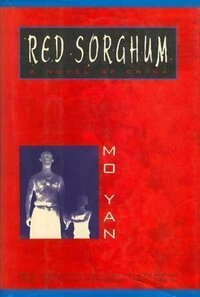You need to sign in or sign up before continuing.
Take a photo of a barcode or cover
Let me first say ... I understand, in essence, why this was a Nobel prize winner. The imagery is beautiful ... I saw every single scene vividly.However, this book is very dense and took me forever to read. Not sure if it's because of the translation, the graphic violence or the super small print and really thin paper - but instead of a normal week, this took me a month to get through. It's definitely not something to read if you like lighter fun fare.
Brutal, visceral and incredibly detailed descriptions of violence are the bulk of every page, but the steady, rhythmic return to describing the sorghum offers just enough soothing to the reader to dive in again. While some moments were hard to take, overall this was still very readable.
The story is told completely out of order - seemingly as things occur to the narrator we hear about them. This caused some repetition that was a little irritating. Basically, we'd hear a short version of what's going to happen in a few sentences and sometime later get the full description.
The story is told completely out of order - seemingly as things occur to the narrator we hear about them. This caused some repetition that was a little irritating. Basically, we'd hear a short version of what's going to happen in a few sentences and sometime later get the full description.
For anyone who loves multigenerational family sagas and learning about a period/place in history that's not typically taught (in the US at least), this is an excellent novel. History tends to be interpreted and retold in large swaths, dominated by important people and great ideological shifts. Red Sorghum takes such a tumultuous time and place as China from the decline of the imperial era through the establishment of communism, with a focus on the Japanese occupation of the Chinese mainland, and focuses with laser-like precision on one pretty regular family in a pretty regular provincial town. The results are profound and of great literary depth. For all these reasons, I recommend this book very highly, but I would warn those who have a hard time reading a lot of detailed violence. It was a very violent time and the prose doesn't shy away at all from that fact.
"Red Sorghum: A Novel of China" by Mo Yan.
I read this novel at the suggestion of some of my Chinese ESL students. Thanks guys. A great suggestion.
I have finished the English translation of "Red Sorghum" (红高粱家族) by the Chinese novelist Mo Yan.
It is a great read. In the first person, it tells the story of a Chinese family in the 1920s-1970s. On a national level, the novel includes: the Chinese Civil War, World War Two, the Japanese invasion of China, and the Chinese Cultural Revolution. On a personal level, it tells of family disputes, pain, and death.
A tale of tragedy. The novel is more of a song or a painting than a story. Time is unimportant. Each chapter jumps forward and backwards in time. Names change, different people at different times have different names. The story is told in a haze of detail and obscurity. The novel describes tragedy.
The novel is not about details, even though the novel has many, many details. The novel is about the land of China and its people. An unchanging pattern of the past. The only certainties are people, life, sorrow, and of course sorghum, which is always there. Sorghum is the only real certainty. Sorghum represents China. Sorghum is food, wine, survival, and life. No matter what problems, sorghum and China will always exist.
Of course, at the end of the novel, the author returns to his home and finds that the sorghum has been replaced with new artificial grain. This represents, I believe, the "new" China of the late 20th century.
Does this mean that the novel is not a tragedy, but about the bright future of China?
Compared to western novels? Difficult to say, because some western novels are in the same style. This is called "magic realism". Salman Rushdie, the Indian/British novelist writes in this style, though differently from Mo Yan, but most western novels are strictly linear in time and tell a story from start to finish: 1, 2, 3, 4, and 5.
To summarise. Yes, it is a great novel. Interesting, challenging, and entertaining, though not a happy read. A great writer. Though I will say I still prefer Liu Cixin to Mo Yan. :).
I read this novel at the suggestion of some of my Chinese ESL students. Thanks guys. A great suggestion.
I have finished the English translation of "Red Sorghum" (红高粱家族) by the Chinese novelist Mo Yan.
It is a great read. In the first person, it tells the story of a Chinese family in the 1920s-1970s. On a national level, the novel includes: the Chinese Civil War, World War Two, the Japanese invasion of China, and the Chinese Cultural Revolution. On a personal level, it tells of family disputes, pain, and death.
A tale of tragedy. The novel is more of a song or a painting than a story. Time is unimportant. Each chapter jumps forward and backwards in time. Names change, different people at different times have different names. The story is told in a haze of detail and obscurity. The novel describes tragedy.
The novel is not about details, even though the novel has many, many details. The novel is about the land of China and its people. An unchanging pattern of the past. The only certainties are people, life, sorrow, and of course sorghum, which is always there. Sorghum is the only real certainty. Sorghum represents China. Sorghum is food, wine, survival, and life. No matter what problems, sorghum and China will always exist.
Of course, at the end of the novel, the author returns to his home and finds that the sorghum has been replaced with new artificial grain. This represents, I believe, the "new" China of the late 20th century.
Does this mean that the novel is not a tragedy, but about the bright future of China?
Compared to western novels? Difficult to say, because some western novels are in the same style. This is called "magic realism". Salman Rushdie, the Indian/British novelist writes in this style, though differently from Mo Yan, but most western novels are strictly linear in time and tell a story from start to finish: 1, 2, 3, 4, and 5.
To summarise. Yes, it is a great novel. Interesting, challenging, and entertaining, though not a happy read. A great writer. Though I will say I still prefer Liu Cixin to Mo Yan. :).
With all the controversy surrounding Mo Yan's receipt of the Nobel Prize in Literature last year I thought it might be interesting to read something of what he's written. Overall, I enjoyed the book (or really,s series of books within one cover), with the interconnected stories of different family members and various tangential characters. It's the first time I've read a Chinese novel, and I don't know how much is the translation and how much the original, but I did find the constant back and forth to different parts of the timeline, generally with no indication that a time shift was taking place, to be a little disconcerting. I often found myself a paragraph or two into a section before realizing that the story had jumped 20 years in one direction or another. And, while I realize that the title of the book involves the plant red sorghum, obviously, there are whole sections of the book where the phrase is used in every sentence, page after page, relentlessly. We got it, red sorghum is important to the story. You don't have to beat us over the head with it.
These ancestors are larger than life. In their loves and infidelities, in their fight against the Japanese army, in their endurance of horrific tragedies, they are the stuff of legend. In the depiction of Northeast Gaomi Township, where these ancestors lived and fought, the novel brought a sense of place in the 1930's and 40's thrillingly to life. The red sorghum that surrounded the village became a potent metaphor for blood and passion. The bridge over Black Water River was the setting for unforgettable scenes of confrontation. It was a time when people were not only fighting off corpse-eating dogs but were dogs themselves. A milita dressed itself in dog pelts. Living under later Communist rule, the narrator, who records the heroism of his grandparents and parents and fellow villagers, is ashamed to be a mere rabbit. One who repeats the words and wishes of others, with no voice of his own.
Confession: I started this book, could not get on with it and put it aside for a while. What was different when I restarted it I don't know but this time, I got the style and really enjoyed the back and forth flow. It reminded me of listening to someone whose memory for details is sharp but has lost where things are in time, so you hear snippets and then have to piece them together. This also gave a vivid portrayal of a country at a point in time and the violence which shook the country into a revolution.
A beautifully written story that is nothing short of a bloodbath. In the five mini-novella chapters of the book (all structured in the same basic way), Mo Yan chronicles the story of a family from Northeast Gaomi Township as they face the Japanese and their own strifes during the second Sino-Japanese war.
The language is breathtaking, vivid and rich, and I loved every description of the natural world in which the story takes place. That same language is also used to describe what I think must be the most horrific and goriest scenes I've ever read, and I'll admit that it was just too much for me past a certain point. I started skimming past the spilling guts and rivers of blood and flying limbs and crunching bones. I was hoping that these descriptions would be offset with equally intense moments of tenderness or kindness, but those just never came. What of the love story between the narrator's father and mother? Or of the narrator's own path in life? All I was left with was trauma, blood, death. Ufff. I don't know how other readers handled that!
I did find Grandma's death totally beautiful - perhaps because she is the one character that died with a smile on her lips, peace in her heart.
The language is breathtaking, vivid and rich, and I loved every description of the natural world in which the story takes place. That same language is also used to describe what I think must be the most horrific and goriest scenes I've ever read, and I'll admit that it was just too much for me past a certain point. I started skimming past the spilling guts and rivers of blood and flying limbs and crunching bones. I was hoping that these descriptions would be offset with equally intense moments of tenderness or kindness, but those just never came. What of the love story between the narrator's father and mother? Or of the narrator's own path in life? All I was left with was trauma, blood, death. Ufff. I don't know how other readers handled that!



